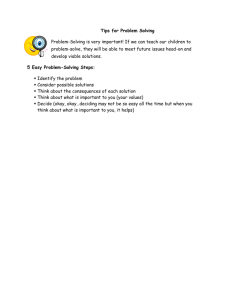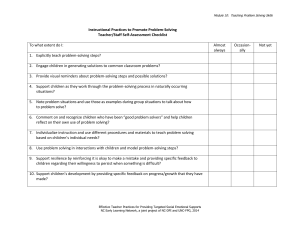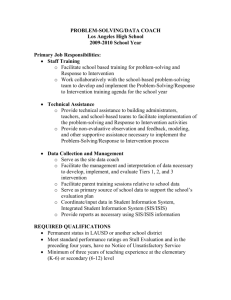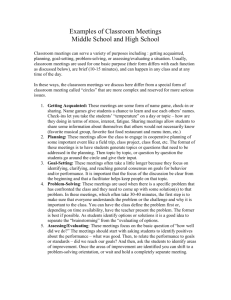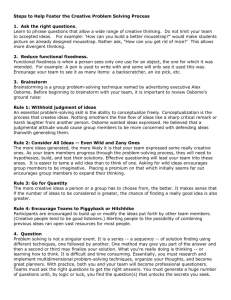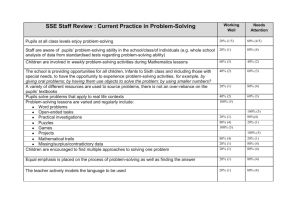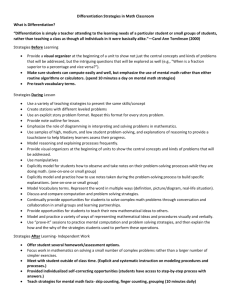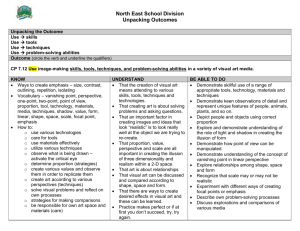How Classroom Organisation Supports and Develops Problem
advertisement
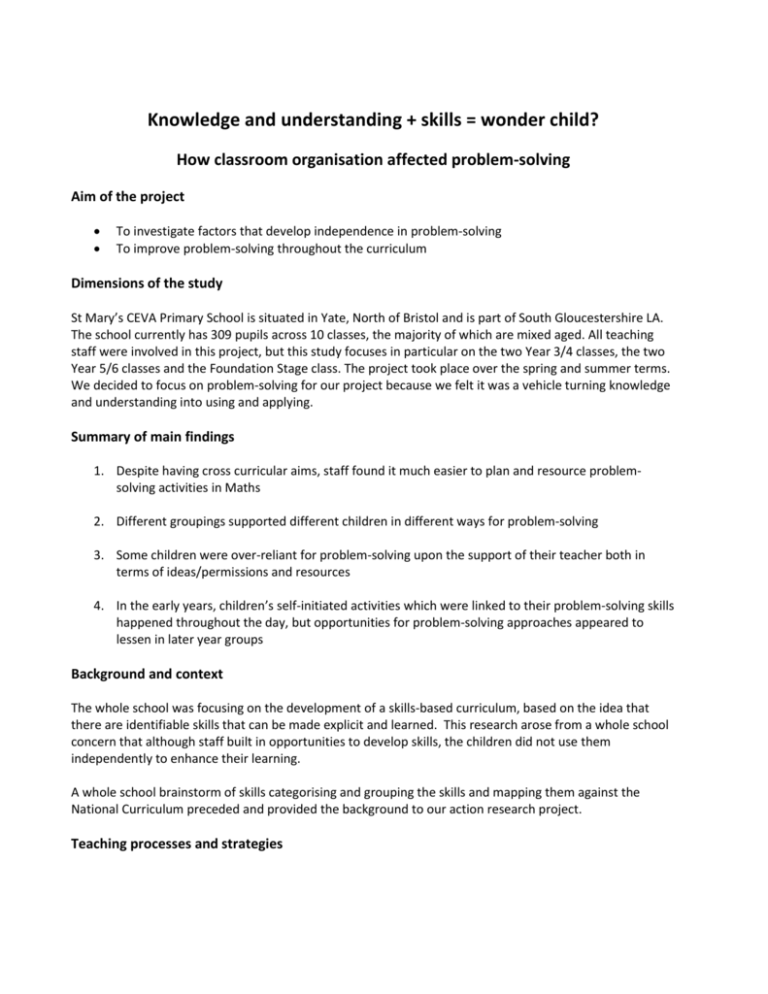
Knowledge and understanding + skills = wonder child? How classroom organisation affected problem-solving Aim of the project To investigate factors that develop independence in problem-solving To improve problem-solving throughout the curriculum Dimensions of the study St Mary’s CEVA Primary School is situated in Yate, North of Bristol and is part of South Gloucestershire LA. The school currently has 309 pupils across 10 classes, the majority of which are mixed aged. All teaching staff were involved in this project, but this study focuses in particular on the two Year 3/4 classes, the two Year 5/6 classes and the Foundation Stage class. The project took place over the spring and summer terms. We decided to focus on problem-solving for our project because we felt it was a vehicle turning knowledge and understanding into using and applying. Summary of main findings 1. Despite having cross curricular aims, staff found it much easier to plan and resource problemsolving activities in Maths 2. Different groupings supported different children in different ways for problem-solving 3. Some children were over-reliant for problem-solving upon the support of their teacher both in terms of ideas/permissions and resources 4. In the early years, children’s self-initiated activities which were linked to their problem-solving skills happened throughout the day, but opportunities for problem-solving approaches appeared to lessen in later year groups Background and context The whole school was focusing on the development of a skills-based curriculum, based on the idea that there are identifiable skills that can be made explicit and learned. This research arose from a whole school concern that although staff built in opportunities to develop skills, the children did not use them independently to enhance their learning. A whole school brainstorm of skills categorising and grouping the skills and mapping them against the National Curriculum preceded and provided the background to our action research project. Teaching processes and strategies We explored the kinds of activities that teachers of different age groups within the school used to develop their pupils’ problem-solving skills. All the teachers planned two activities covering different areas of the curriculum. The teachers experimented with different ways of grouping the pupils (by age, gender and friendship) and we looked at what difference, if any, this made to the way the pupils went about the problem-solving tasks. In the Year 5/6 classes, the teachers planned for children to take part in problem-solving activities relating to the current year group project focus. In Year 3/4, the two classes explicitly focused on problem-solving whilst the Foundation Stage focused on adult-facilitated and child-initiated activities. Problem-solving activities with Year 5/6 classes The first of the two activities carried out in Year 5/6 challenged the children to build a bridge out of different foodstuffs with a set of defined outcomes. They worked in gender groups of six to consider the properties of the different materials and test their hypotheses. During this activity the conversations held by the male groups focused on properties of the structure, for example, “Rods need to be flexible”, “Will the bridge be stable?”, whilst the girls tended to be more concerned with the mechanics of the construction, for example “Measure it”, “With a knife we’ll have to make a little incision”. When the children completed a questionnaire after the activity, one girl commented that they had learnt “how hard it was to work with your friends in an all girl group”; another commented that “team work was important and it’s no good if one person takes over”. It was also suggested that the groups were too big. The second activity in the Year 5/6 classes involved children working in mixed ability, mixed gender groups of four, to plan and produce a programme for Ancient Greek Olympic games using 36 given statements, e.g. children must be involved in three different games, wrestling and running cannot occur at the same time. During this session the teachers observed how the mixed groups tended to divide into gender pairs and work independently; some girl groups concentrated on the attractiveness of the programme or worked in isolation. The teachers also noticed that in this task, the higher ability children tended to be more systematic in their approach to the problem. Problem-solving activities with Year 3/4 classes In the Year 3/4 classes the teachers planned lessons specifically to develop problem-solving skills. In the first activity, the children were asked to form friendship groups of disparate sizes and their task was to stand on a mat and evolve different ways to turn it over without stepping off. Teacher observations showed that in this activity the male friendship groups tended to become more argumentative, physical and frustrated, whilst the female groups adopted a more collaborative approach; negotiating with each other and listening, evaluating and persevering. In the second task the children were split into age-related groups and were asked to find a way to ensure that an egg, dropped from a height, would have a safe landing. It was noticeable that in most groups, one or two children became involved in the challenge while the others engaged in peripheral activities. Once the project took shape the children regained their enthusiasm and recombined as a group. Problem-solving activities at Foundation Stage In the Foundation Stage classroom, four children (two boys and two girls) were playing with a train set. Their teacher acted as a co-player, and suggested that they added a bridge. The children all worked together and supported each other. In the second activity, some drainpipes and guttering were put out on the playground and a bucket of water was left nearby. The children were asked to clean them as they were dirty. The grouping was random; it started with four boys and two girls, but was flexible with three boys and one girl staying for the duration, joined by others. The children worked together discussing the equipment, collecting different equipment, then joining the guttering together and observing the water flow. The third activity was adult initiated. The children were offered the chance of buying toys from the toyshop and the teacher suggested different ways of paying for the toys using different coins. Some children chose to work with a friend and others worked individually. The children who had a better understanding of the value of coins, shared their knowledge and expertise with their peers. The findings 1. Problem-solving activities tended to be Maths-based Despite having the intention of planning problem-solving activities across the curriculum, we found that they frequently involved Maths, e.g. the Year 5/6 Olympic Games activity and Foundation Stage shopping activity. It appeared to be inherently easier to plan a problem-solving activity involving Maths. This may have been because the teachers felt more in control where there was a measurable outcome. It may also have been due to the nature of our resourcing which was mainly Maths-based. This was confirmed by an inventory of problem-solving resources freely available to the children we made at the start of the project which showed that with the exception of the Foundation Stage classes, the resources supported mainly Maths-based activities. On scrutinising planning it was evident that maths based problem-solving was happening throughout the school. 2. There were advantages and disadvantages to different groupings Pupil interviews revealed that some children thrived when working in friendship groups whereas others found it more difficult. One child commented: “It is easier working with friends as they already know what each of them are good at…their strengths”. When asked to expand, she said “Me and Ellie kind of sorted out the maths and Abi was trying to think ahead to the timetable”. However the same group suggested that it’s not always good to work with friends as you may become distracted. 3. Year 3/4 pupils tended to rely on teacher support The children tended to rely upon the support of their teacher both in terms of ideas/permissions and resources. This was particularly evident in Years 3 and 4. For example, one group requested assistance from their teacher on two occasions rather than working through their problem with the group. Another group was finding it difficult the seal the bottom of the device they had designed to protect their egg, so handed it to their teacher to finish. In addition to this, during pupil conferences, children were asked ’if you had to solve a problem in class how you would do it?’ Most children after Year 1 said they would refer to their teachers if they required assistance or resources. 4. Opportunities for self initiated activities diminished as pupils got older In the early years classes, self-initiated activities were undertaken throughout the day whilst opportunities for problem-solving approaches lessened as the pupils got older. The younger children appeared to be confident about trying things, accepted failure and worked effectively together. As they got older, the children appeared to be constrained by the desire to get it right, their need to please the teacher and to conform to rules. These findings were borne out by observations undertaken in the research. This may also be due to the teaching becoming more didactic, which may be the result of the perceived prescriptiveness of the curriculum and pressure of end of key stage assessment. There was some evidence that from Year 5, some aspects of independent problem-solving were regained and refined. Research methods We focused on qualitative processes including interviews, video, photographs, lesson observations, questionnaires, informal discussions with colleagues and scrutiny of planning documents. We also carried out an inventory of problem-solving resources. The project had three strands or sub-questions: What concepts and beliefs about problem-solving do teachers hold? What kind of environments support problem-solving activities? (resources, classroom set up, groupings etc) What kinds of activities can help children to develop their problem-solving skills? Conclusion Through this research we have found that independence in problem-solving is dependent on teachers’ attitudes and understanding, the availability of resources and the culture, size and make up of groupings. We also found that the majority of problem-solving activities were Maths-based. Problem-solving seemed to become more constrained as the children moved through the school, which resulted in the children becoming less confident and independent. They also appeared to lose the skills they had in the Foundation Stage. Following this research we intend to: share the findings with staff and discuss the implications; agree with staff that planning for all curriculum subjects will contain provision for problem-solving activities; provide opportunities for children to work in different groupings on a regular basis; develop a set of success criteria to demonstrate effective, independent problem-solving; ask staff to monitor pupils’ progress and revisit termly; seek out resources that will support problem-solving across the curriculum; and give staff the opportunity to observe effective problem-solving in the Foundation Stage and devise a plan with whole staff to promote problem-solving. Suggestions for further reading Burden, R. and Williams, M. (1998) Thinking Through the Curriculum, London: Routeledge Higgins, S. (2002) Learning to Learn Primary Geography. pg. 22-23 Jackson, E. (2002) Developing a thinking culture Primary Geographer. pg 34-35 Mc Guinness, C. (1999) Thinking Skills to Thinking Classrooms: a review and evaluation of approaches for developing pupils’ thinking (Research Report RR115), London: DfES Riley, J. (2000) Thinking to learn: Learning to Think Primary Practice (no.25) pg. 15-21 Wilson, R. (2003) The Creative Curriculum, Wakefield: Andrell Education Authors’ contact details Sue Laing, Bethan Scriven and Mary Baskerville St. Mary’s Primary School Church Road Yate BS37 5BG TEL. 01454867155

